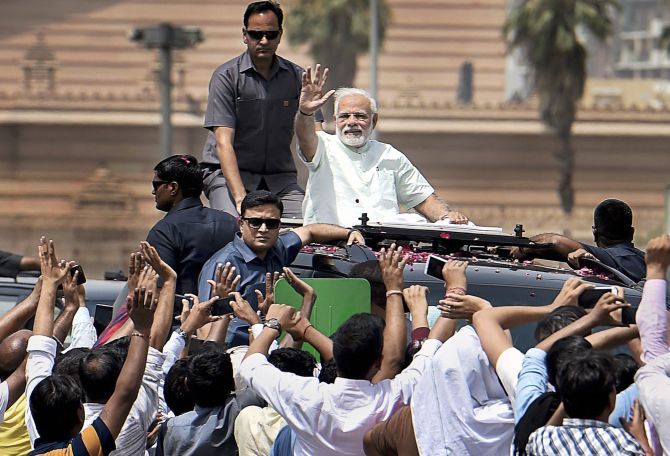Some Maoist leaders were conspiring to assassinate Prime Minister Narendra Modi and planned to procure arms and ammunition to wage a war against the country, Pune police claimed in its chargesheet in the Elgar Parishad case filed on Thursday.

The police also said that the Maoists are trying to mobilise and incite Dalits and the Elgar Parishad conclave in Pune last December was part of this strategy.
The Maoist-backed conclave "aggravated" the violence at Koregaon Bhima on January 1, the chargesheet said.
The over 5,000-page chargesheet named 10 persons, including activists Surendra Gadling, Mahesh Raut, Shoma Sen, Rona Wilson and Sudhir Dhavale, all arrested on June 6.
Besides, it named five Maoist leaders believed to be underground: Dipak alias Milind Teltumbade, Kishan Da alias Prashant Bose, Prakash alias Rituparn Goswami, Deepu and Manglu.
"Maoist leaders including...Rona Wilson and fugitive Kishan Da were conspiring the assassination of Prime Minister Narendra Modi and waging war against the country for which they were planning to procure arms and ammunition," it stated.
The police cited several documents seized from the Maoist leaders to make the claim on Modi's assassination plan.
The larger conspiracy of Communist Party of India-Maoists was to overthrow the democratic system in the country, and the accused were working in that direction, the chargesheet claimed.
The chargesheet, under the Unlawful Activities (Prevention) Act and IPC, was filed in the court of district and sessions Judge Kishor D Vadane in Pune.
The Elgar Parishad had been organised with "inspiration, money and directions" of Maoists, it alleged.
"It is the policy of the CPI-Maoists... to mobilise Dalit community's sentiments and mislead them and provoke them to take violent path against the system," it said.
"As a part of this strategy, Sudhir Dhavale and other members of Kabir Kala Manch (KKM, a cultural group) spread hatred by giving inciting speeches, presenting distorted history and staging provocative skits and songs," it said.
On the directions of CPI-Maoists Dhavale and KKM, under the banner of Bhima-Koregaon Shaurya Din Prerana Abhiyan, galvanised Dalit organisations and organised Elgar Parishad on December 31, the charge sheet said.
"During the conclave, inciting speeches were made, inflammatory songs and street plays were played...all these things aggravated the violence on January 1, 2018 at Bhima Koregaon (in Pune district) during 200th commemoration of Bhima Koregaon battle," it said.
Assistant Commissioner of Police Shivaji Pawar, the investigating officer, said Pune Police recorded the statement of surrendered Maoist leader Pahad Singh.
"Singh gave details of Milind Teltumbade's role. He revealed that Teltumbade has the responsibility of spreading Maoist network in urban areas and he is particularly involved in mobilizing the Dalit community for Maoist activities," he said.
Singh's statement is part of the chargesheet.
Vishrambaug police station in Pune had initially registered a case on the complaint of Tushar Damgude who alleged that "provocative" speeches at Elgar Parishad led to violence at Bhima Koregaon in which one person was killed.
In August, Pune Police arrested rights activist Sudha Bharadwaj, Telugu poet Varavara Rao, Vernon Gonsalves, Arun Ferreira and Gautam Navlakha in the case. The charge sheet does not name them.
Dalits at a commemoration event of the Bhima Koregon battle -- in which the forces of the Peshwa, ruler of Pune, were defeated by the British East India Company -- came under attack on January 1.
While Dalits see the victory as an assertion of their identity as the British forces included Mahar (a formerly untouchable caste) soldiers, some Hindu right-wing organisations were opposed to the celebration.











 © 2025
© 2025